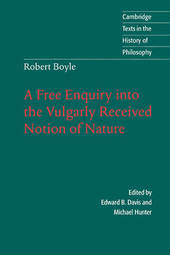
|
Robert Boyle: A Free Enquiry into the Vulgarly Received Notion of Nature
Hardback
Main Details
Description
In this book, published in 1686, the scientist Robert Boyle (1627-91) attacked prevailing notions of the natural world which depicted 'Nature' as a wise, benevolent and purposeful being. Boyle, one of the leading mechanical philosophers of his day, believed that the world was best understood as a vast, impersonal machine, fashioned by an infinite, personal God. In this cogent treatise, he drew on his scientific findings, his knowledge of contemporary medicine and his deep reflection on theological and philosophical issues, arguing that it was inappropriate both theologically and scientifically to speak of Nature as if it had a mind of its own: instead, the only true efficient causes of things were the properties and powers given to matter by God. As such, A Free Enquiry into the Vulgarly Received Notion of Nature represents one of the subtlest statements concerning the philosophical issues raised by the mechanical philosophy to emerge from the period of the scientific revolution.
Reviews"This work, which admirably testifies to Boyle's equal concern for 'truth and philosophical freedom' and 'religion', deserves this new edition. And, as Davis and Hunter suggest at the end of their introduction, today an essay on the idea of nature can have more than a simple historical significance." Guido Giglioni, Isis
|